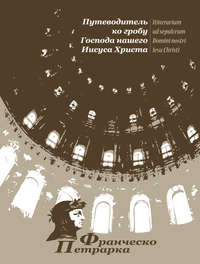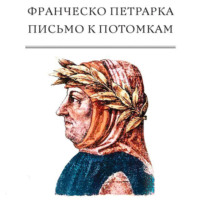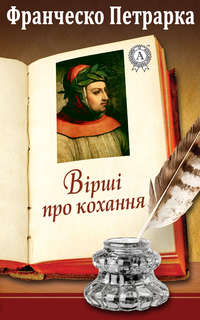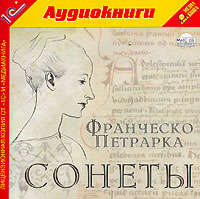 полная версия
полная версияThe Sonnets, Triumphs, and Other Poems of Petrarch
After having performed his duties at the jubilee, Petrarch returned to Padua, taking the road by Arezzo, the town which had the honour of his birth. Leonardo Aretino says that his fellow-[Pg lxxviii]townsmen crowded around him with delight, and received him with such honours as could have been paid only to a king.
In the same month of December, 1350, he discovered a treasure which made him happier than a king. Perhaps a royal head might not have equally valued it. It was a copy of Quintilian's work "De Institutione Oratoria," which, till then, had escaped all his researches. On the very day of the discovery he wrote a letter to Quintilian, according to his fantastic custom of epistolizing the ancients. Some days afterwards, he left Arezzo to pursue his journey. The principal persons of the town took leave of him publicly at his departure, after pointing out to him the house in which he was born. "It was a small house," says Petrarch, "befitting an exile, as my father was." They told him that the proprietors would have made some alterations in it; but the town had interposed and prevented them, determined that the place should remain the same as when it was first consecrated by his birth. The poet related what had been mentioned to a young man who wrote to him expressly to ask whether Arezzo could really boast of being his birthplace. Petrarch added, that Arezzo had done more for him as a stranger than Florence as a citizen. In truth, his family was of Florence; and it was only by accident that he was born at Arezzo. He then went to Florence, where he made but a short stay. There he found his friends still alarmed about the accident which had befallen him in his journey to Rome, the news of which he had communicated to Boccaccio.
Petrarch went on to Padua. On approaching it, he perceived a universal mourning. He soon learned the foul catastrophe which had deprived the city of one of its best masters.
Jacopo di Carrara had received into his house his cousin Guglielmo. Though the latter was known to be an evil-disposed person, he was treated with kindness by Jacopo, and ate at his table. On the 21st of December, whilst Jacopo was sitting at supper, in the midst of his friends, his people and his guards, the monster Guglielmo plunged a dagger into his breast with such celerity, that even those who were nearest could not ward off the blow. Horror-struck, they lifted him up, whilst others put the assassin to instant death.
The fate of Jacopo Carrara gave Petrarch a dislike for Padua, and his recollections of Vaucluse bent his unsettled mind to return to its solitude; but he tarried at Padua during the winter. Here he spent a great deal of his time with Ildebrando Conti, bishop of that city, a man of rank and merit. One day, as he was dining at the Bishop's palace, two Carthusian monks were announced: they were well received by the Bishop, as he was partial to their order. He asked them what brought them to Padua. "We are going," they said, "to Treviso, by the direction of our general, there to remain and establish a monastery." Ildebrando asked if they knew Father Gherardo, Petrarch's brother. The two monks, who did not know the poet, gave the most pleasing accounts of his brother.
The plague, they said, having got into the convent of Montrieux, the prior, a pious but timorous man, told his monks that flight was the only course which they could take: Gherardo answered with courage, "Go whither you please! As for myself I will remain in the situation in which Heaven has placed me." The prior fled to his own country, where death soon overtook him. Gherardo remained in the convent, where the plague spared him, and left him alone, after having destroyed, within a few days, thirty-four of the brethren who had continued with him. He paid them every service, received their last sighs, and buried them when death had taken off those to whom that office belonged. With only a dog left for his companion, Gherardo watched at night to guard the house, and took his repose by day. When the summer was over, he went to a neighbouring monastery of the Carthusians, who enabled him to restore his convent.
While the Carthusians were making this honourable mention of Father Gherardo, the prelate cast his eyes from time to time upon Petrarch. "I know not," says the poet, "whether my eyes were filled with tears, but my heart was tenderly touched." The Carthusians, at last discovering who Petrarch was, saluted him with congratulations. Petrarch gives an account of this interview in a letter to his brother himself.
Padua was too near to Venice for Petrarch not to visit now and then that city which he called the wonder of the world. He there made acquaintance with Andrea Dandolo, who was made Doge in 1343, though he was only thirty-six years of age, an extraordinary elevation for so young a man; but he possessed extraordinary merit. His mind was cultivated; he loved literature, and easily became, as far as mutual demonstrations went, the personal friend of Petrarch; though the Doge, as we shall see, excluded this personal friendship from all influence on his political conduct.
The commerce of the Venetians made great progress under the Dogeship of Andrea Dandolo. It was then that they began to trade with Egypt and Syria, whence they brought silk, pearls, the spices, and other products of the East. This prosperity excited the jealousy of the Genoese, as it interfered with a commerce which they had hitherto monopolized. When the Venetians had been chased from Constantinople by the Emperor Michael Paleologus, they retained several fortresses in the Black Sea, which enabled them to continue their trade with the Tartars in that sea, and to frequent the fair of Tana. The Genoese, who were masters of Pera, a suburb of Constantinople, would willingly have joined the Greeks in expelling their Italian rivals altogether from the Black Sea; and privateering hostilities actually commenced between the two republics, which, in 1350, extended to the serious aspect of a national war.
The winter of that year was passed on both sides in preparations. The Venetians sent ambassadors to the King of Arragon, who had some differences with the Genoese about the Island of Sardinia, and to the Emperor of Constantinople, who saw with any sensation in the world but delight the flag of Genoa flying over the walls of Pera. A league between those three powers was quickly concluded, and their grand, common object was to destroy the city of Genoa.
It was impossible that these great movements of Venice should be unknown at Padua. Petrarch, ever zealous for the common good of Italy, saw with pain the kindling of a war which could not but be fatal to her, and thought it his duty to open his heart to the Doge of Venice, who had shown him so much friendship. He addressed to him, therefore, the following letter from Padua, on the 14th of March, 1351:—
"My love for my country forces me to break silence; the goodness of your character encourages me. Can I hold my peace whilst I hear the symptoms of a coming storm that menaces my beloved country? Two puissant people are flying to arms; two flourishing cities are agitated by the approach of war. These cities are placed by nature like the two eyes of Italy; the one in the south and west, and the other in the east and north, to dominate over the two seas that surround them; so that, even after the destruction of the Roman empire, this beautiful country was still regarded as the queen of the world. I know that proud nations denied her the empire of the land, but who dared ever to dispute with her the empire of the sea?
"I shudder to think of our prospects. If Venice and Genoa turn their victorious arms against each other, it is all over with us; we lose our glory and the command of the sea. In this calamity we shall have a consolation which we have ever had, namely, that if our enemies rejoice in our calamities, they cannot at least derive any glory from them.
"In great affairs I have always dreaded the counsels of the young. Youthful ignorance and inexperience have been the ruin of many empires. I, therefore, learn with pleasure that you have named a council of elders, to whom you have confided this affair. I expected no less than this from your wisdom, which is far beyond your years.
"The state of your republic distresses me. I know the difference that there is between the tumult of arms and the tranquillity of Parnassus. I know that the sounds of Apollo's lyre accord but ill with the trumpets of Mars; but if you have abandoned Parnassus, it has been only to fulfil the duties of a good citizen and of a vigilant chief. I am persuaded, at the same time, that in the midst of arms you think of peace; that you would regard it as a triumph for yourself, and the greatest blessing you could procure for your country. Did not Hannibal himself say that a sure peace was more valuable than a hoped-for victory! If truth has extorted this confession from the most warlike man that ever lived, is it not plain that a pacific man ought to prefer peace even to a certain victory? Who does not know that peace is the greatest of blessings, and that war is the source of all evils?
"Do not deceive yourself; you have to deal with a keen people who know not what it is to be conquered. Would it not be better to transfer the war to Damascus, to Susa, or to Memphis? Think besides, that those whom you are going to attack are your brothers. At Thebes, of old, two brothers fought to their mutual destruction. Must Italy renew, in our days, so atrocious a spectacle?
"Let us examine what may be the results of this war. Whether you are conqueror or are conquered, one of the eyes of Italy will necessarily be blinded, and the other much weakened; for it would be folly to flatter yourself with the hopes of conquering so strong an enemy without much effusion of blood.
"Brave men, powerful people! (I speak here to both of you) what is your object—to what do you aspire? What will be the end of your dissensions? It is not the blood of the Carthaginians or the Numantians that you are about to spill, but it is Italian blood; the blood of a people who would be the first to start up and offer to expend their blood, if any barbarous nation were to attempt a new irruption among us. In that event, their bodies would be the bucklers and ramparts of our common country; they would live, or they would die with us. Ought the pleasure of avenging a slight offence to carry more weight with you than the public good and your own safety? Let revenge be the delight of women. Is it not more glorious for men to forget an injury than to avenge it? to pardon an enemy than to destroy him?
"If my feeble voice could make itself heard among those grave men who compose your council, I am persuaded that you would not only not reject the peace which is offered to you, but go to meet and embrace it closely, so that it might not escape you. Consult your wise old men who love the republic; they will speak the same language to you that I do.
"You, my lord, who are at the head of the council, and who govern your republic, ought to recollect that the glory or the shame of these events will fall principally on you. Raise yourself above yourself; look into, examine everything with attention. Compare the success of the war with the evils which it brings in its train. Weigh in a balance the good effects and the evil, and you will say with Hannibal, that an hour is sufficient to destroy the work of many years.[Pg lxxxii]
"The renown of your country is more ancient than is generally believed. Several ages before the city of Venice was built, I find not only the name of the Venetians famous, but also that of one of their dukes. Would you submit to the caprices of fortune a glory acquired for so long a time, and at so great a cost? You will render a great service to your republic, if, preferring her safety to her glory, you give her incensed and insane populace prudent and useful counsels, instead of offering them brilliant and specious projects. The wise say that we cannot purchase a virtue more precious than what is bought at the expense of glory. If you adopt this axiom, your character will be handed down to posterity, like that of the Duke of the Venetians, to whom I have alluded. All the world will admire and love you.
"To conceal nothing from you, I confess that I have heard with grief of your league with the King of Arragon. What! shall Italians go and implore succour of barbarous kings to destroy Italians? You will say, perhaps, that your enemies have set you the example. My answer is, that they are equally culpable. According to report, Venice, in order to satiate her rage, calls to her aid tyrants of the west; whilst Genoa brings in those of the east. This is the source of our calamities. Carried away by the admiration of strange things, despising, I know not why, the good things which we find in our own climate, we sacrifice sound Italian faith to barbarian perfidy. Madmen that we are, we seek among venal souls that which we could find among our own brethren.
"Nature has given us for barriers the Alps and the two seas. Avarice, envy, and pride, have opened these natural defences to the Cimbri, the Huns, the Goths, the Gauls, and the Spaniards. How often have we recited the words of Virgil:—
"'Impius hæc tam culta novalia miles habebit,Barbarus has segetes.'"Athens and Lacedemon had between them a species of rivalship similar to yours: but their forces were not by any means so nearly balanced. Lacedemon had an advantage over Athens, which put it in the power of the former to destroy her rival, if she had wished it; but she replied, 'God forbid that I should pull out one of the eyes of Greece!' If this beautiful sentiment came from a people whom Plato reproaches with their avidity for conquest and dominion, what still softer reply ought we not to expect from the most modest of nations!
"Amidst the movements which agitate you, it is impossible for me to be tranquil. When I see one party cutting down trees to construct vessels, and others sharpening their swords and darts, I should think myself guilty if I did not seize my pen, which is my only weapon, to counsel peace. I am aware with what circumspection we ought to speak to our superiors; but the love of[Pg lxxxiii] our country has no superior. If it should carry me beyond bounds, it will serve as my excuse before you, and oblige you to pardon me.
"Throwing myself at the feet of the chiefs of two nations who are going to war, I say to them, with tears in my eyes, 'Throw away your arms; give one another the embrace of peace! unite your hearts and your colours. By this means the ocean and the Euxine shall be open to you. Your ships will arrive in safety at Taprobane, at the Fortunate Isles, at Thule, and even at the poles. The kings and their people will meet you with respect; the Indian, the Englishman, the Æthiopian, will dread you. May peace reign among you, and may you have nothing to fear!' Adieu! greatest of dukes, and best of men!"
This letter produced no effect. Andrea Dandolo, in his answer to it, alleges the thousand and one affronts and outrages which Venice had suffered from Genoa. At the same time he pays a high compliment to the eloquence of Petrarch's epistle, and says that it is a production which could emanate only from a mind inspired by the divine Spirit.
During the spring of this year, 1351, Petrarch put his last finish to a canzone, on the subject still nearest to his heart, the death of his Laura, and to a sonnet on the same subject. In April, his attention was recalled from visionary things by the arrival of Boccaccio, who was sent by the republic of Florence to announce to him the recall of his family to their native land, and the restoration of his family fortune, as well as to invite him to the home of his ancestors, in the name of the Florentine republic. The invitation was conveyed in a long and flattering letter; but it appeared, from the very contents of this epistle, that the Florentines wished our poet's acceptance of their offer to be as advantageous to themselves as to him. They were establishing a University, and they wished to put Petrarch at the head of it. Petrarch replied in a letter apparently full of gratitude and satisfaction, but in which he by no means pledged himself to be the gymnasiarch of their new college; and, agreeably to his original intention, he set out from Padua on the 3rd of May, 1351, for Provence.
Petrarch took the road to Vicenza, where he arrived at sunset. He hesitated whether he should stop there, or take advantage of the remainder of the day and go farther. But, meeting with some interesting persons whose conversation beguiled him, night came on before he was aware how late it was. Their conversation, in the course of the evening, ran upon Cicero. Many were the eulogies passed on the great old Roman; but Petrarch, after having lauded his divine genius and eloquence, said something about his inconsistency. Every one was astonished at our poet's boldness, but particularly a man, venerable for his age and knowledge, who was an idolater of Cicero. Petrarch argued[Pg lxxxiv] pretty freely against the political character of the ancient orator. The same opinion as to Cicero's weakness seems rather to have gained ground in later ages. At least, it is now agreed that Cicero's political life will not bear throughout an uncharitable investigation, though the political difficulties of his time demand abundant allowance.
Petrarch departed next morning for Verona, where he reckoned on remaining only for a few days; but it was impossible for him to resist the importunities of Azzo Correggio, Guglielmo di Pastrengo, and his other friends. By them he was detained during the remainder of the month. "The requests of a friend," he said, on this occasion, "are always chains upon me."
Petrarch arrived, for the sixth time, at Vaucluse on the 27th of June, 1351. He first announced himself to Philip of Cabassoles, Bishop of Cavaillon, to whom he had already sent, during his journey, some Latin verses, in which he speaks of Vaucluse as the most charming place in the universe. "When a child," he says, "I visited it, and it nourished my youth in its sunny bosom. When grown to manhood, I passed some of the pleasantest years of my life in the shut-up valley. Grown old, I wish to pass in it my last years."
The sight of his romantic hermitage, of the capacious grotto which had listened to his sighs for Laura, of his garden, and of his library, was, undoubtedly, sweet to Petrarch; and, though he had promised Boccaccio to come back to Italy, he had not the fortitude to determine on a sudden return. He writes to one of his Italian friends, "When I left my native country, I promised to return to it in the autumn; but time, place, and circumstances, often oblige us to change our resolutions. As far as I can judge, it will be necessary for me to remain here for two years. My friends in Italy, I trust, will pardon me if I do not keep my promise to them. The inconstancy of the human mind must serve as my excuse. I have now experienced that change of place is the only thing which can long keep from us the ennui that is inseparable from a sedentary life."
At the same time, whilst Vaucluse threw recollections tender, though melancholy, over Petrarch's mind, it does not appear that Avignon had assumed any new charm in his absence: on the contrary, he found it plunged more than ever in luxury, wantonness, and gluttony. Clement VI. had replenished the church, at the request of the French king, with numbers of cardinals, many of whom were so young and licentious, that the most scandalous abominations prevailed amongst them. "At this time," says Matthew Villani, "no regard was paid either to learning or virtue; and a man needed not to blush for anything, if he could cover his head with a red hat. Pietro Ruggiero, one of those exemplary new cardinals, was only eighteen years of age." Petrarch vented his indignation on this occasion in his seventh eclogue, which is a satire upon the Pontiff and his cardinals, the interlocutors being Micione, or Clement himself, and Epi, or the city of Avignon. The poem, if it can be so called, is clouded with allegory, and denaturalized with pastoral conceits; yet it is worth being explored by any one anxious to trace the first fountains of reform among Catholics, as a proof of church abuses having been exposed, two centuries before the Reformation, by a Catholic and a churchman.
At this crisis, the Court of Avignon, which, in fact, had not known very well what to do about the affairs of Rome, were now anxious to inquire what sort of government would be the most advisable, after the fall of Rienzo. Since that event, the Cardinal Legate had re-established the ancient government, having created two senators, the one from the house of Colonna, the other from that of the Orsini. But, very soon, those houses were divided by discord, and the city was plunged into all the evils which it had suffered before the existence of the Tribuneship. "The community at large," says Matthew Villani, "returned to such condition, that strangers and travellers found themselves like sheep among wolves." Clement VI. was weary of seeing the metropolis of Christianity a prey to anarchy. He therefore chose four cardinals, whose united deliberations might appease these troubles, and he imagined that he could establish in Rome a form of government that should be durable. The cardinals requested Petrarch to give his opinion on this important affair. Petrarch wrote to them a most eloquent epistle, full of enthusiastic ideas of the grandeur of Rome. It is not exactly known what effect he produced by his writing on this subject; but on that account we are not to conclude that he wrote in vain.
Petrarch had brought to Avignon his son John, who was still very young. He had obtained for him a canonicate at Verona. Thither he immediately despatched him, with letters to Guglielmo di Pastrengo and Rinaldo di Villa Franca, charging the former of these friends to superintend his son's general character and manners, and the other to cultivate his understanding. Petrarch, in his letter to Rinaldo, gives a description of John, which is neither very flattering to the youth, nor calculated to give us a favourable opinion of his father's mode of managing his education. By his own account, it appears that he had never brought the boy to confide in him. This was a capital fault, for the young are naturally ingenuous; so that the acquisition of their confidence is the very first step towards their docility; and, for maintaining parental authority, there is no need to overawe them. "As far as I can judge of my son," says Petrarch, "he has a tolerable understanding; but I am not certain of this, for I do not sufficiently know him. When he is with me he always keeps silence; whether my presence is irksome and confusing to him, or whether shame for his ignorance closes his lips. I suspect it is the latter,[Pg lxxxvi] for I perceive too clearly his antipathy to letters. I never saw it stronger in any one; he dreads and detests nothing so much as a book; yet he was brought up at Parma, Verona, and Padua. I sometimes direct a few sharp pleasantries at this disposition. 'Take care,' I say, 'lest you should eclipse your neighbour, Virgil.' When I talk in this manner, he looks down and blushes. On this behaviour alone I build my hope. He is modest, and has a docility which renders him susceptible of every impression." This is a melancholy confession, on the part of Petrarch, of his own incompetence to make the most of his son's mind, and a confession the more convincing that it is made unconsciously.
In the summer of 1352, the people of Avignon witnessed the impressive spectacle of the far-famed Tribune Rienzo entering their city, but in a style very different from the pomp of his late processions in Rome. He had now for his attendants only two archers, between whom he walked as a prisoner. It is necessary to say a few words about the circumstances which befell Rienzo after his fall, and which brought him now to the Pope's tribunal at Avignon.
Petrarch says of him at this period, "The Tribune, formerly so powerful and dreaded, but now the most unhappy of men, has been brought hither as a prisoner. I praised and I adored him. I loved his virtue, and I admired his courage. I thought that Rome was about to resume, under him, the empire she formerly held. Ah! had he continued as he began, he would have been praised and admired by the world and by posterity. On entering the city," Petrarch continues, "he inquired if I was there. I knew not whether he hoped for succour from me, or what I could do to serve him. In the process against him they accuse him of nothing criminal. They cannot impute to him having joined with bad men. All that they charge him with is an attempt to give freedom to the republic, and to make Rome the centre of its government. And is this a crime worthy of the wheel or the gibbet? A Roman citizen afflicted to see his country, which is by right the mistress of the world, the slave of the vilest of men!"









